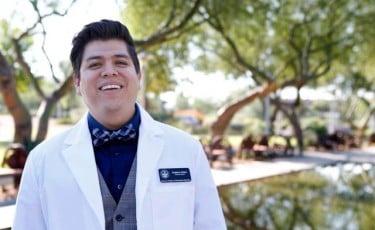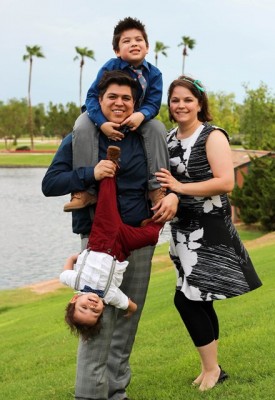By Michael Ferraresi
GCU Today Magazine
In medical school, there are few breaks from studying. It’s constant, especially with a full schedule of courses in biochemistry, anatomy, embryology and clinical medicine.
Gustavo Anton reminds himself that all the reading, memorizing and understanding his complex course material is critical to becoming a pediatric surgeon. The work is challenging for any med school student. But for Anton, who overcame dyslexia to earn his premed degree from Grand Canyon University in 2012, studying for his courses at Midwestern University’s Arizona College of Osteopathic Medicine in Glendale requires some creative prep work to ensure laser-precision focus. (Click HERE to read more about Midwestern University's agreement to reserve graduate-program seats for GCU students meeting rigorous academic standards.)
“Every time I’m sitting down to study, I put on the TV or an episode on Netflix or something like that,” said Anton, who earned his master’s degree in biomedical sciences from Midwestern before beginning his doctoral program this summer.
Yes, having an episode of “The Office” or “Scrubs” on in the living room actually helped him study for the highly competitive Medical College Admission Test.
Anton, 30, prints out his course materials on orange paper and wears eyeglasses with blue lenses to help read other printouts on white paper, using techniques that he picked up at GCU to help him focus on the volumes of medical literature he digests on a nightly basis. It’s a little different, but it has worked wonders for a man who struggled to read throughout his childhood.
“If it’s quiet, I will start reading and my mind will just wander, like daydreaming,” he said. “When I have the TV on that doesn’t happen. Also, with the colored glasses, it just calms things down.”
Anton said his late start on college was the result of a lack of confidence caused by his dyslexia, but he discovered GCU’s biology premed program to be the perfect fit. Instructors were sympathetic to his reading challenges and recognized his natural analytical skills in the laboratory.
The native of Mexico never earned higher than a B in high school. His parents dropped out of middle school to work as laborers. For them, attending college was never an option.
Anton continued to struggle with reading and writing at GCU but started earning better grades once he understood his condition, which his family failed to fully grasp when he was a kid in Mexico. Once he was in the U.S., teachers attributed his poor reading skills to the language barrier, inaccurately describing him as “a little slow.”
At GCU, Anton proved more studious than his earliest teachers gave him credit for. Plus, the west Phoenix campus gave him a touch of nostalgia. He recalled visiting GCU as a student with his Mesa High School science class and falling in love with the cadaver lab, used to train undergraduates in medical dissection.
“I don’t know what it was, but all the cutting, dissecting and finding out what’s underneath all that skin — it’s a good feeling,” he said. “That was my class, my area. I loved the dissecting and discovering the differences that everyone has with vasculature.”
With a little research about dyslexia, a little extra preparedness with his studies and a lot of reading with the TV on, Anton began chasing his dream to become a doctor.
Family sought ‘something better’
For Anton, pediatric medicine is a passion that he realized when he was young. Yet he ignored his calling, delayed going to college because he felt he might not be able to make the grade and ended up selling cars in Apache Junction before deciding to follow his dream.
Earning a decent salary and commission as a used car salesman was nice. Anton said the money helped him support his family, but he was miserable at work. Sales did not reflect his true self. He felt called to pediatrics but had no college degree.
Anton was 25 when his wife, Mary, and father, Gustavo Sr., cornered him with an intervention. They sat him down and reminded him that he had his whole life ahead. It was time for him to listen to his heart and make an impact in the lives of ill children.
“They said, ‘Quit your job, we’ll take care of everything. We want you to get a 4.0 and go to med school,’” he said.
With that nudge, Anton found his way to GCU. He He applied to the biology premed program and began what he knew would be a multiyear process of becoming a doctor.
Anton was in elementary school when his father moved the family from Mexico to Arizona in search of a better future. In the beginning, that meant low-wage jobs for his dad as a fast-food restaurant janitor and recreational vehicle power-washer.
“He always wanted something better for us than what he had,” said Anton, who has two sons Kalel, 7, and Atom, 2.
Kalel was diagnosed with Asperger syndrome and was nonverbal until he was 4, Anton said. The boy has since demonstrated many of the traits of a savant, especially with reading, writing and mathematics. He just turned 7 but is already doing multiplication and long division like a third- or fourth-grader.
So as Anton works his way through medical school, constantly challenging himself with academic materials, he and his wife also face the challenge of keeping their sons intellectually satisfied. Parenting an autistic child, however, is a full-time job in itself. Mary Anton is earning her undergraduate degree in special education at GCU, too, so both parents are juggling their academic pursuits amid the busy schedule of their young family.
Dr. Scott Soby, a microbiology professor at Midwestern , said Anton’s family story and working-class roots prove that anyone is capable of following their dream. Anton, he said, has a clear passion for studying pediatric medicine.
Shortly after his acceptance, Anton volunteered to help in one of Soby’s labs, joined the Midwestern University Pediatric Medicine Club and got into the habit of networking with medical professionals in any way he could.
“As good a student as he is, he’s going to be a better doctor,” Soby said. “He has a great feel for people. Everyone who works with him likes him.”
Dedicated to becoming a doctor
Like any graduate school, medical schools see their fair share of attrition as some students either fail to meet their program’s academic standards or decide to take an alternative career path.
Anton said GCU’s premed program prepared him for the rigors of Midwestern’s program. He had an early taste of what med school classes and labs would be like.
“It’s a lot of information coming at you pretty fast,” Anton said of his undergraduate studies. “You digest a lot.”
At GCU, premed students are part of the College of Science, Engineering and Technology, along with those from undergraduate biology programs in physical therapy, pharmacy and physician assistant. Students in each program must successfully complete standardized tests, ace their interviews with graduate school panels and demonstrate academic excellence in other ways to exceed admissions expectations for highly competitive health care graduate schools.
Anton said he thought GCU faculty and staff prepared him for med school by getting him thinking about those admissions steps earlier than usual. He also credited GCU faculty with teaching him the fundamentals of biology lab work, which has carried him through his earliest labs at Midwestern.
“That last year, with those 400-level classes, it gives you a little hint of what level of coursework is coming in medical school,” Anton said.
Haley Peebles, associate director of GCU’s Center for Integrated Science, Engineering and Technology, said Anton was one of the most motivated students in her dissection class. She said Anton’s reaction to dissecting parts of the human body revealed his natural interest in seeing what lies beneath, a common passion of many GCU biology students.
“It was the ability to be hands-on rather than just reading the material,” said Peebles, who taught dissection and organized GCU’s cadaver lab before assuming her current role with CISET.
“(Anton is) very genuine, caring and compassionate,” Peebles said. “He also really enjoyed learning about the human body. Dissection really appeals to science-minded students who want to see the unseen and to learn how to remove something from the body without destroying it.”
Anton says that delicate touch is something he has grown to understand in great detail. With each research assignment and lab activity, he refines his approach. Now he just focuses on following his natural path in life — with the TV on or off.
Reach Michael Ferraresi at 602-639-7030 or [email protected].





































































